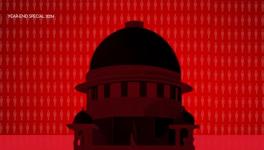Activists Demand Restoration of PCPNDT Rules, Call Govt. Notification ‘Illegal and Arbitrary’
Activists have written to the Ministry of Health and Family Welfare (MoHFW) on June 20, seeking the removal an “illegal” notification which suspended provisions of the pre-natal sex selection law, citing an increase in the number of reported cases.
Social activist Tara Ahluwalia, who has worked for the protection of women’s and children’s rights in Bhilwara, Rajasthan, is among those who have written to Union Health Minister Dr. Harsh Vardhan, seeking that the suspension of provisions of the Pre-Conception and Pre-Natal Diagnostic Techniques (Prohibition of Sex Selection) Act (PCPNDT Act), 1994, should not be extended beyond June 30. There have been cases of sex selective abortion which have been reported, and the adverse impact of a government notification must be studied, the activists wrote.
On April 4, 2020, while the country was under a lockdown to contain the COVID-19 pandemic, the MoHFW issued a notification to defer or suspend certain provisions of the PCPNDT Act till June 30.
The petitioner in the case, Dr. Sabu Mathew George, approached the Supreme Court saying the notification was “illegal and arbitrary”. He questioned how provisions of an Act passed by Parliament could be temporarily frozen through a notification, when the law itself did not provide for it.
The notification said that Rule 8, Rule 9 (8) and Rule 18 A (6) of the Act would be suspended. These pertain to renewal of registration of facilities offering pre-natal testing, mandatory monthly reports of all pre-conception or pregnancy-related procedures at all laboratories, ultrasound clinics and other facilities, and bringing to knowledge those that are conducting techniques that lead to the detection of the sex of the foetus – procedures which are illegal and punishable under law.
“The action of the Central Government in suspending certain Rules under the PCPNDT Act, 1994, despite not having the power to do so, violates Article 14 and 21 of the Constitution, as (in addition to being without jurisdiction) the Central Government has arbitrarily and selectively weakened a legislation aimed at curbing the pernicious activity of sex-selection and sex-determination (sic),” the petition said.
“The number of girls missing at birth due to the practice of gender biased sex selection in India has been estimated at 0.46 million girls per year for the period 2001-12 (which is a total of 5.52 million girl children, missing at birth for the 12-year period), and the PCPNDT Act and the rules thereunder are aimed at remedying this social evil. By suspending the rules the Central Government has diluted the PCPNDT Act, and this will result in misuse of technology by unscrupulous individuals, who will no longer be deterred by the monitoring mechanism provided in the Rules (sic),” the petition added.
The petitioner said that while such medical establishments are functioning, they are expected to maintain records and submit these to the relevant authorities. They added that such a suspension was illegal and unconstitutional.
“The Hon’ble court has, from time to time, monitored the implementation of the PCPNDT Act. Proper and timely keeping of records has a central role to play in the scheme of the Act. In the case of Federation of Obstetrics and Gynaecological Societies of India v. Union of India reported in (2019) 6 SCC 283, … this Hon’ble court observed that proper maintenance of records is mandatory,” the petition stated, adding that in one of the first cases under this Act, the apex court had asked petitioners to approach “this court under Article 32 of the Constitution of India”, given that there was laxity in the implementation of the Act. Article 32 gives individuals the right to move the Supreme Court when they feel their right has been “unduly deprived”. The petition underlined the role of the SC in the proper implementation of the Act.
The petitioner also pointed out that the notification was arbitrary. “These rules have been singled out for suspension, despite the fact that PCPNDT Act is not the only Act requiring detailed record keeping by medical professionals,” the petition stated.
On June 15, the Supreme Court refused to stay the notification suspending rules of the Act, explaining that the services of doctors need to be conserved during a pandemic. The court however asked the petitioner to alert it if moves were made to extend the notification beyond June 30.
In April 2018, The Week reported that doctors had been putting pressure on the government to dilute provisions of the PCPNDT Act, claiming they were being criminally prosecuted for “clerical” errors. Petitioner Dr. Sabu George, a member of the National Inspection and Monitoring Committee under the Act, was quoted saying: “Strong deterrent sections will be amended by bringing in graded punishments. Also, the plan is to make family members liable for filling the form F (detailed form for maintenance) rather than the doctor. Right now, if there is a case against the doctor, the burden of proof is on them to prove innocence. The doctors want the blame shifted to the family.”
In their letter to the Health Minister on June 20, activists and medical practitioners stated that the notification was served to dilute the Act, and set the wrong precedent. “After the PCPNDT Rules were suspended, incidents of sex determination test were reported from Bhatinda, Ludhiana, Warangal and Hyderabad during the nationwide lockdown. It is important to note that these are a few reported cases whereas the number of unreported cases of sex determination test would be much higher. Hence, this is clear that the suspension of PCPNDT Rules has certainly provided avenues for the misuse of medical technologies,” the activists wrote.
With provisions of the lockdown having been relaxed, clinics have now begun functioning again. “Today most of the states are only giving registration certificate to centres/clinics and not monitoring their practice,” the petition said. Effective implementation of the Act calls for stringent monitoring, the activists asserted, urging the minister to study the impact of the suspension of rules.
The SC will take up the matter for final hearing on July 17.
The writer is an independent journalist. The views are personal
Get the latest reports & analysis with people's perspective on Protests, movements & deep analytical videos, discussions of the current affairs in your Telegram app. Subscribe to NewsClick's Telegram channel & get Real-Time updates on stories, as they get published on our website.
























